Politics
Dozens of Indian Umrah pilgrims feared dead as bus crashes near Madina
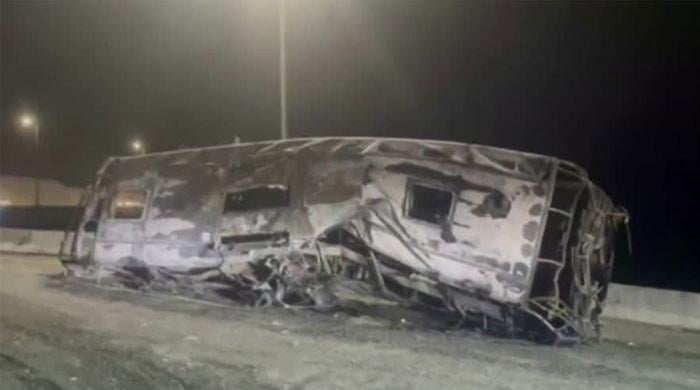
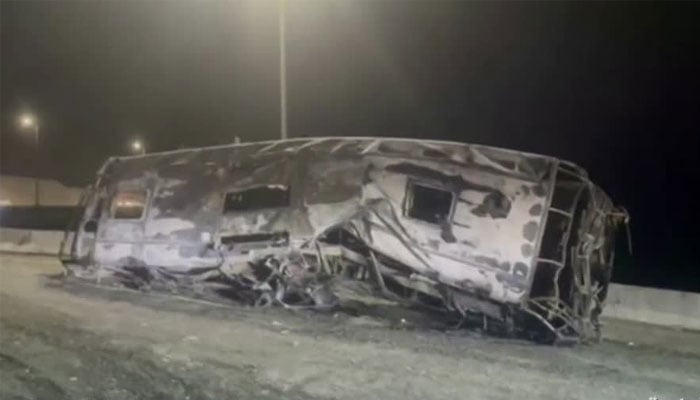
- Embassy in Riyadh, Jeddah consulate assisting affected families.
- PM Modi expresses grief, prays for quick recovery of the injured.
- Millions visit kingdom for Umrah in addition to annual Hajj pilgrims.
RIYADH: The Indian embassy in Saudi Arabia on Monday said a “tragic” bus crash involving Muslim pilgrims occurred near the holy city of Madina overnight, with India’s Prime Minister Narendra Modi offering his condolences.
“Deeply saddened by the accident in Madina involving Indian nationals. My thoughts are with the families who have lost their loved ones,” the prime minister wrote on X.
“I pray for the swift recovery of all those injured. Our Embassy in Riyadh and consulate in Jeddah are providing all possible assistance,” he added.
Indian media reported dozens had potentially been killed in the incident, though officials have yet to provide a toll.
Millions visit Saudi Arabia for the Umrah pilgrimage, which happens outside of the Hajj period.
In March 2023, a bus ferrying pilgrims to the holy city of Makkah burst into flames after a collision on a bridge, killing 20 people and injuring more than two dozen others.
And in October 2019, some 35 foreigners were killed and four others injured when a bus collided with another heavy vehicle near Madina.
Pilgrimages are an essential component of Saudi Arabia’s burgeoning tourism sector that officials hope will help diversify the kingdom’s economy away from fossil fuels.
The Gulf kingdom is also home to more than two million Indian nationals who have long played a pivotal role in its labour market, helping construct many of the country’s mega-projects while sending billions of dollars in remittances back home each year.
Politics
UAE says it will not allow territory to be used against Iran
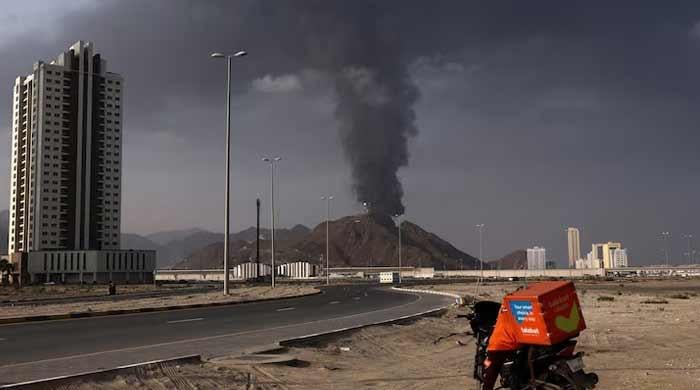
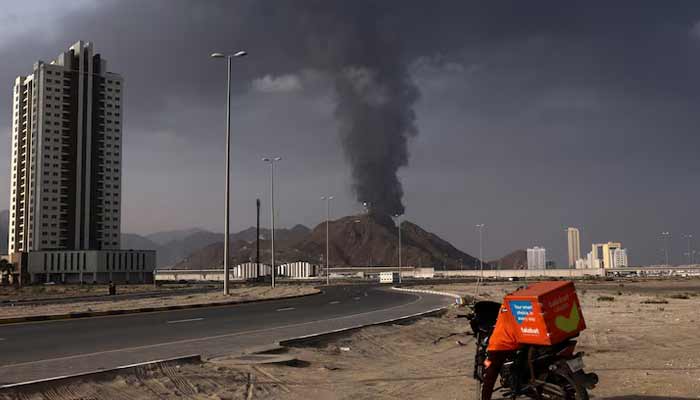
ABU DHABI: The United Arab Emirates said it will not allow its airspace or territory to be used for attacks against Iran, as officials outlined security, economic and humanitarian measures on Tuesday during a media briefing in Abu Dhabi.
Reem Al Hashimy, Minister of State for International Co-operation, said the UAE’s position was clear and measured. “The UAE will not permit its airspace or land to be used in any attack against Iran,” she said, adding that the country had the right to defend itself to protect its sovereignty and the safety of citizens, residents and visitors.
She described Iran’s ballistic missile programme as a threat to the wider region and said the security of Gulf states was “indivisible”. Al Hashimy added that there was no military solution to the crisis and warned that further escalation would harm regional stability.
The minister confirmed that the UAE had closed its embassy in Tehran and withdrawn its ambassador in response to recent Iranian attacks.
Separately, Major General Abdul Nasser Al Humaidi, official spokesperson for the Ministry of Defence, said the UAE would “never accept its sovereignty and security being compromised”.
He said the sounds heard in recent days were the result of missile interceptions and confirmed that the armed forces were at a high level of combat readiness. The UAE possesses strategic defence reserves capable of countering aerial threats for an extended period, he added.
On the economic front, Economy and Tourism Minister Abdulla bin Touq said the country holds sufficient strategic reserves of basic food and essential goods to meet demand for between four and six months.
“There is no risk of shortages,” he said, adding that authorities were closely monitoring markets to prevent unjustified price increases. He urged residents to avoid panic buying or over-purchasing.
Bin Touq also announced that 80 flights per day would operate during the current phase to facilitate travel for those wishing to leave.
The National Emergency Crisis and Disaster Management Authority (NCEMA) said daily life across the UAE continues as normal, with all essential services fully operational.
Politics
Khamenei’s Death Puts Hassan Khomeini in Spotlight
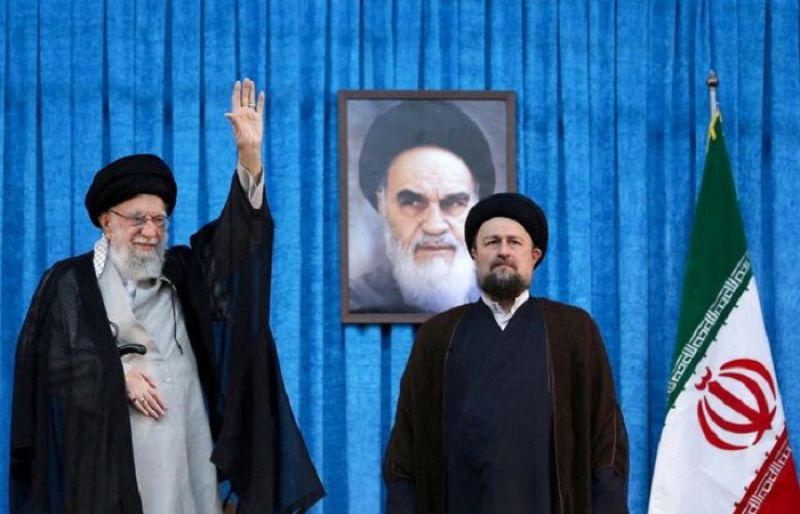

The death of Ali Khamenei has intensified debate over who will lead Iran next, with attention turning to Hassan Khomeini, grandson of the Islamic Republic’s founder.
Clerics in Iran’s powerful Assembly of Experts are responsible for appointing the next Supreme Leader, and Khamenei’s killing has accelerated what had long been a sensitive and unresolved succession question.
A Symbolic Heir
Hassan Khomeini, 53, is the grandson of Ruhollah Khomeini, the revolutionary leader who established the Islamic Republic in 1979.
He currently serves as custodian of his grandfather’s mausoleum in southern Tehran, a role that carries strong symbolic weight in Iranian politics.
Although he has never held formal government office, he is considered influential within clerical circles and maintains close ties with reformist figures.
Seen as a Relative Moderate
Hassan Khomeini is widely viewed as more moderate compared to hardline factions that consolidated power during Khamenei’s tenure.
He has publicly criticised the Guardian Council for disqualifying reformist candidates.
He called for accountability following the 2022 death of Mahsa Amini, which sparked nationwide protests.
He supported diplomatic engagement during the 2015 nuclear agreement negotiations.
However, he has also defended the Islamic Republic’s system and criticised anti-government unrest, underscoring his loyalty to the state structure.
Barred From Electoral Politics
In 2016, Hassan Khomeini attempted to run for the Assembly of Experts but was disqualified by the Guardian Council, reportedly over religious credential requirements. Many observers interpreted the move as an effort to prevent a reformist challenge.
Despite this setback, he remains a respected cleric with connections across political factions, including ties to the Islamic Revolutionary Guard Corps (IRGC).
Succession Uncertain
The selection of a new Supreme Leader will shape Iran’s domestic and foreign policy direction at a moment of heightened regional tension.
Some analysts argue that appointing a more moderate figure could help stabilise internal dissent and improve international positioning. Others believe hardliners may push for continuity.
The Assembly of Experts is expected to begin deliberations amid a 40-day national mourning period declared following Khamenei’s death.
Politics
France to boost nuclear arsenal, involve European allies in deterrence
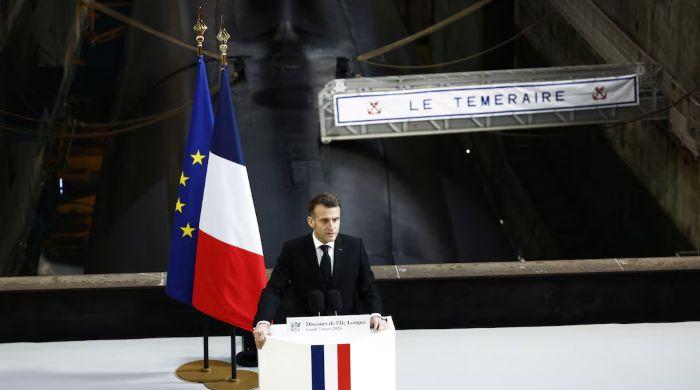

- France to expand nuclear arsenal amid geopolitical risks.
- European allies to join French nuclear wargames.
- France-Germany nuclear steering group to start cooperation.
PARIS: France will expand its nuclear arsenal and will potentially allow European partners to host its aircraft on nuclear deterrence missions, President Emmanuel Macron said on Monday, signalling a major doctrine change for France and the continent.
Though France and Britain are both nuclear powers, most European countries have relied primarily on the United States for deterring any potential adversaries — a decades-old pillar of transatlantic security.
But Trump’s rapprochement with Russia on the Ukraine war and his harsher posture towards traditional allies have rattled European governments, and some countries have expressed interest in how Paris could protect them by extending its nuclear umbrella.
“We are currently experiencing a period of geopolitical upheaval fraught with risk,” Macron said in a speech delivered from a submarine base in Brittany, adding that a hardening of the French deterrence model was needed.
Unveiling the update to France’s nuclear doctrine, a once-per-term ritual for presidents, Macron promised more cooperation with European allies that have expressed interest.
Germany, but also Greece, Poland, the Netherlands, Belgium, Denmark and Sweden would be able to take part in French nuclear wargames.
“I believe I can say our partners are ready,” Macron said.
Still, Macron gave no details on how the enhanced nuclear drive would be funded, while making clear decision-making on nuclear strikes will remain solely in the hands of the French president.
Arming up together
German Chancellor Friedrich Merz said in a joint statement with Macron that France and Germany had established a nuclear steering group to discuss deterrence issues and would start concrete cooperation this year.

That would include participation by conventional German forces in French nuclear exercises and joint visits to strategic sites, as well as the development of non-nuclear capabilities with France and other European partners.
Polish Prime Minister Donald Tusk said on X Poland was in talks “with France and a group of closest European allies on the programme of advanced nuclear deterrence”.
“We are arming up together with our friends so that our enemies will never dare to attack us,” he added.
The French leader said it would be possible to establish, under unspecified circumstances, strategic assets in other European countries that would be part of what he called a new “forward deterrence” doctrine.
“Our strategic air forces could be spread deep into the European continent,” Macron said, without giving more details.
Although the size of France’s nuclear arsenal is based on a strategy of “strict sufficiency”, the number of French warheads will be increased, Macron said.
France spends roughly 5.6 billion euros ($6.04 billion) a year to maintain its stockpile of 290 submarine- and air-launched weapons — the world’s fourth-largest arsenal. Britain has 225 nuclear warheads. Russia and the United States have more than 5,000 each.
Macron said close ties on nuclear deterrence will continue with Britain. He also said the current rethink of French nuclear doctrine has been done in total transparency with Washington, and was complementary to Nato’s nuclear mission.
-

 Politics5 days ago
Politics5 days agoWhat are Iran’s ballistic missile capabilities?
-

 Business7 days ago
Business7 days agoHouseholds set for lower energy bills amid price cap shake-up
-

 Politics5 days ago
Politics5 days agoUS arrests ex-Air Force pilot for ‘training’ Chinese military
-

 Sports5 days ago
Sports5 days agoSri Lanka’s Shanaka says constant criticism has affected players’ mental health
-

 Sports1 week ago
Sports1 week agoTop 50 USMNT players of 2026, ranked by club form: USMNT Player Performance Index returns
-

 Business7 days ago
Business7 days agoLucid widely misses earnings expectations, forecasts continued EV growth in 2026
-
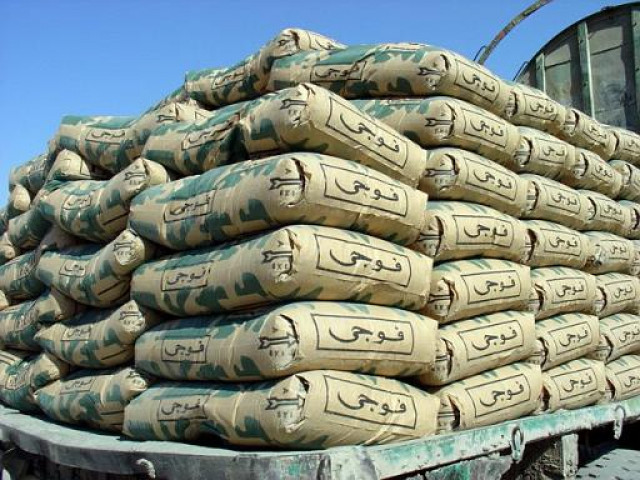
 Business5 days ago
Business5 days agoAttock Cement’s acquisition approved | The Express Tribune
-
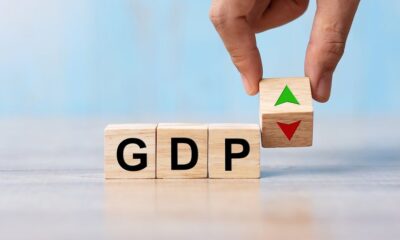
 Fashion1 week ago
Fashion1 week agoOECD GDP growth slows to 0.3% in Q4 amid mixed trends






